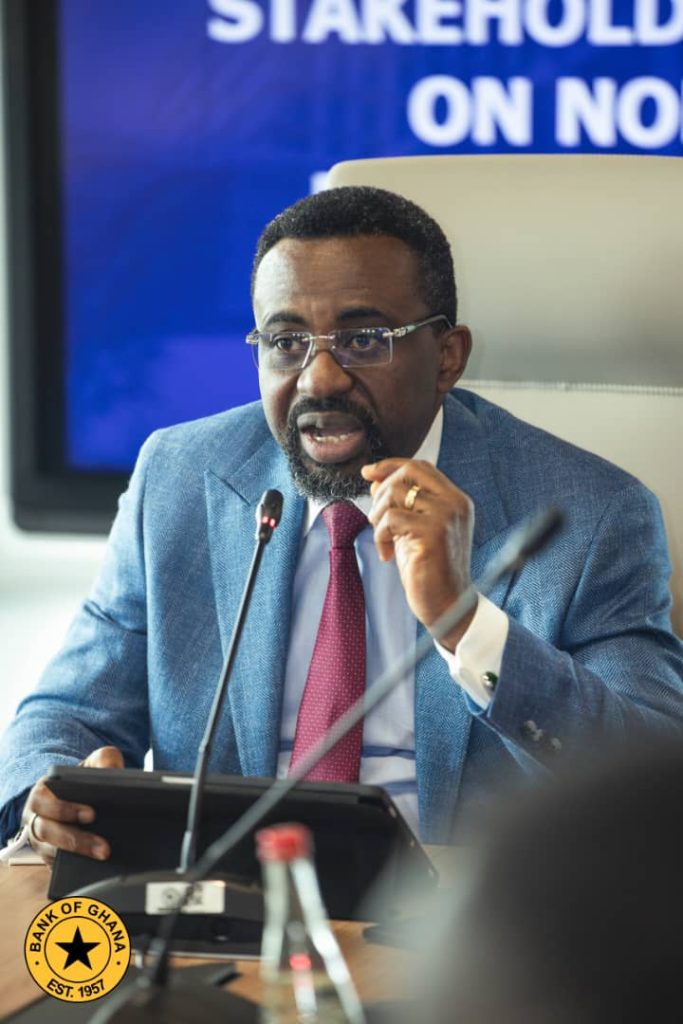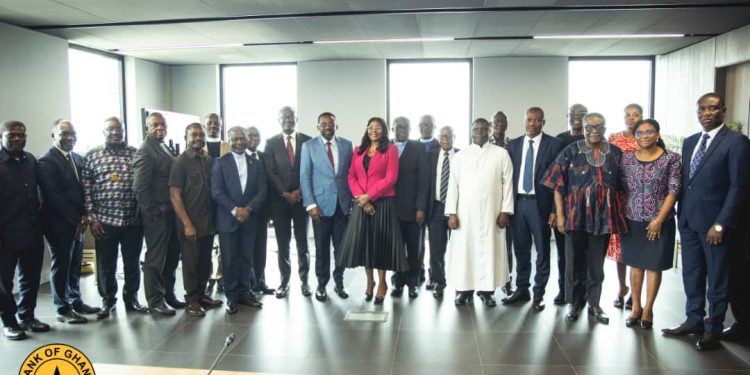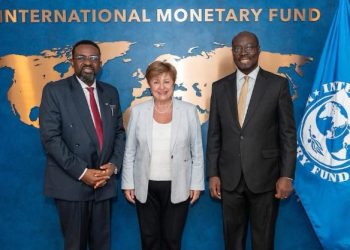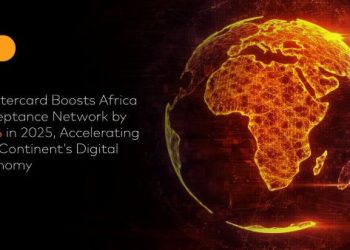The Bank of Ghana has commenced high-level stakeholder engagements with religious leaders to lay the groundwork for the institutionalisation of Non-Interest Banking and Finance (NIBF).
The move is to deepen financial inclusion and introduce alternative ethical finance models in Ghana.
The Governor of the Bank of Ghana, Dr. Johnson Asiama, made this known during an address to members of the clergy, describing the engagement as a “critical cornerstone” of the Bank’s broader reform agenda.
The interaction, part of a nationwide series, sought to sensitise the clergy on the value proposition of NIBF and to solicit feedback that would inform policy and regulatory frameworks ahead of its rollout.
Clergy as key partners in inclusive finance
“The Bank considers stakeholder engagement with the clergy as an important cornerstone for the effective rollout of NIBF governance that will reflect the interest and sensitivity of Ghanaians represented by the clergy,” Dr. Asiama told the gathering.
According to him, the clergy remain long-standing partners of the Central Bank in promoting financial education and inclusion.
Their insight, influence, and feedback are therefore essential to ensuring that NIBF aligns with the ethical and cultural values of Ghanaian society.
The Governor stressed that the Bank’s objective was not only to expand access to financial services but also to build systems rooted in equity, transparency, and shared prosperity.
“This model enhances accountability, discourages moral hazard, and supports real economic activity,” he said.
Non-interest banking: A global movement
Dr. Asiama described Non-Interest Banking as a well-established global financial model that operates without the charging or paying of interest (usury).
Instead, transactions under NIBF are structured around profit-and-loss sharing arrangements, promoting risk-sharing and aligning the interests of financiers and entrepreneurs.
“NIBF has gained considerable global traction, with a total balance sheet size exceeding US$5.5 trillion as of end-December 2025,” he noted.
“It has had a high impact on sovereign and corporate project finance, and a transformative influence on microfinance sectors across various jurisdictions.”
He cited Africa’s growing embrace of NIBF, with countries like Nigeria, Kenya, Uganda, Tanzania, and South Africa establishing NIBF frameworks to enhance financial inclusion for their unbanked populations. Globally, advanced economies such as the United Kingdom, Malaysia, Singapore, the Netherlands, Japan, and Luxembourg have also adopted NIBF to diversify their financial systems and attract ethical investments.

Ethical and responsible finance
The Bank of Ghana Governor underscored the ethical and socially responsible foundations of NIBF, describing it as a tool for “transformative economic justice and inclusive prosperity.”
“NIBF prohibits speculative investments and mandates that all financial transactions be backed by tangible assets or services, thereby reinforcing the link between finance and the real economy,” he explained.
He added that the system restricts financing to ethical sectors, explicitly excluding industries such as alcohol, gambling, adult entertainment, and weapons manufacturing.
“This emphasis on ethical investment reflects a broader commitment to responsible business and the common good,” he said.
Dr. Asiama pointed out that NIBF challenges conventional banking by rejecting the commodification of money and instead promoting partnership-based models such as joint ventures and asset leasing arrangements.
Addressing Ghana’s infrastructure deficit through Sukuk
The Governor used the opportunity to draw attention to Ghana’s persistent infrastructure deficit, particularly in transportation, energy, water and sanitation, and digital connectivity. Citing a United Nations report, he noted that Ghana would require an estimated US$37.9 billion annually to meet its infrastructure financing needs and achieve the Sustainable Development Goals (SDGs).
“In the face of fiscal constraints, innovative instruments such as Sukuk bonds offer a credible alternative to conventional debt,” Dr. Asiama said.
Sukuk, a hallmark instrument under NIBF, facilitates capital mobilisation based on asset-backed structures rather than interest-bearing loans.
The Governor cited successful case studies, including South Africa’s $500 million debut Sukuk in 2014—oversubscribed fourfold—and its subsequent US$1.1 billion issuance in 2023. Nigeria’s sovereign Sukuk programme has since 2017 mobilised approximately US$2.37 billion, funding the construction and rehabilitation of over 4,100 km of roads and nine major bridges.
“These examples underscore the credibility of NIBF as a development-focused, ethical, and inclusive financial tool,” Dr. Asiama said.
Call to action: A shared responsibility
Dr. Asiama concluded his remarks with a passionate call for collaboration and understanding: “Today’s engagement is not merely symbolic—it is a call to action for collaboration, awareness creation, demystifying misconceptions, and commitment to give NIBF a chance to be nurtured within our banking and finance space.
He emphasised that with the right institutional, legal, and regulatory frameworks, Non-Interest Banking could catalyse ethical finance, bridge Ghana’s financial inclusion gap, and mobilise resources for infrastructure development and shared prosperity.
“This is our shared responsibility—one that demands inclusiveness, trust, and ethical commitment,” Dr. Asiama said, urging the clergy to champion the cause and help shape a financial system that serves both commercial interests and social good.













